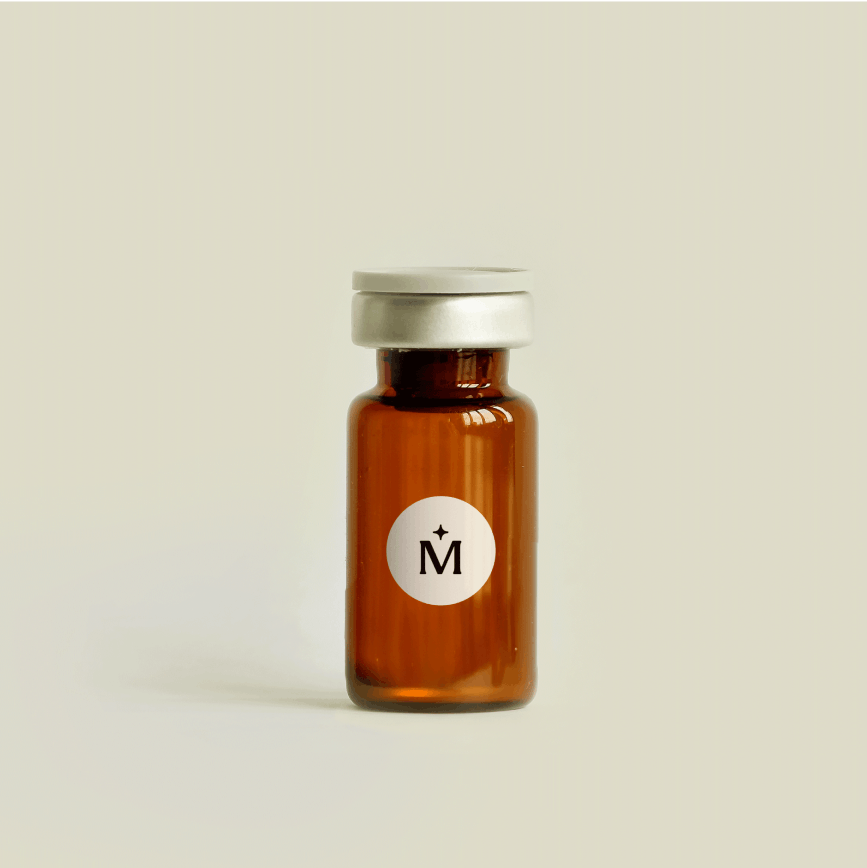Semaglutide
These statements have not been evaluated by the Food and Drug Administration. This product is not intended to diagnose, treat, cure or prevent any disease.

What is semaglutide used for?
Semaglutide may be used for:
- Weight management in overweight or obese patients.
- Blood sugar management in overweight or obese patients.
- Help regulating appetite and food reward signaling in the brain.
- Other conditions as determined by your doctor.
What should I tell my clinician before using semaglutide?
Your clinician will discuss your symptoms and weight and health history before determining if semaglutide is right for you.
You should let your clinician know if you have:
- Allergy to semaglutide or vitamin B12
- Personal or family history of medullary thyroid cancer or other thyroid C-cell cancer
- History of pancreatitis
- History of tachyarrhythmias
- Pregnant or breastfeeding
- Currently struggling with an eating disorder
Additionally, tell your clinician about any other medication you’re taking. Due to the nature of the medication, semaglutide may slow gastric emptying. This could interfere with the breakdown of other medications.
Who shouldn’t use semaglutide?
Don’t use semaglutide if you have a hypersensitivity to semaglutide, vitamin B12, or any component of the formulation or if you have a personal or family history of medullary thyroid cancer (MTC) or Multiple Endocrine Neoplasia syndrome type 2 (MEN 2) or if you do not need it to maintain a healthy weight.
How should semaglutide be administered?
Important: Always follow the package directions and dosing schedule provided by the pharmacy and by your prescriber.
- This medication should be given by subcutaneous injection. A subcutaneous injection delivers medicine into the fatty layer between skin and muscle, used to give a small quantity of certain kinds of medications.
- Rotating your injection site is recommended. Commonly used injection sites include: the outer area of the upper arm, the abdomen (avoiding a 2-inch circle around the navel), or the front of the thigh.
- Wash hands and sanitize the injection site with alcohol prior to administration.
- Do not use the solution if it becomes cloudy, has particles, or changes color.
- Dispose of used needles in a Sharps container.
- Do not use past the beyond use date indicated on the prescription label.
- Keep the medication refrigerated and discard 28 days after initial puncture.
What should I do if I miss a dose of semaglutide?
- If you miss a dose within 5 days of your scheduled dose, administer it as soon as possible.
- If more than 5 days have passed since you missed a dose, skip the missed dose, and continue with your regular dosing schedule.
- Do not double up on doses.
Where should I store my semaglutide medicine?
- Follow the storage recommendations found on your prescription label.
- Store injectable semaglutide at refrigeration, between 36 to 46 degrees F, unless otherwise specified on the packaging.
- Keep away from light sources.
- Keep out of reach from children and pets.
What are common side effects of semaglutide?
Contact your clinician immediately or seek medical attention if you experience:
- Neck mass
- Trouble breathing or swallowing
- Vocal hoarseness that will not go away
- Kidney problems or urinary complications
- Gallbladder problems
- Rapid heartbeat
- Eyesight changes
- Severe dizziness
- Signs of low blood sugar
- Pancreas problems
- Worsening behavioral or mood changes like depression or thoughts of self-harm
- An allergic reaction to this medication. Symptoms of an allergic reaction include rash, itching, swelling, severe dizziness, and/or trouble breathing.
You may experience side effects not listed above. Contact your clinician with questions.
If an overdose is suspected contact your local poison control center at 1-800-222-1222 or go to the nearest emergency room.
You may report side effects to the FDA at 1-800-FDA-1088.
How do I dispose of the injection needles?
We recommend using https://safeneedledisposal.org to find out your state’s specific rules on sharps disposal. Most states allow you to place your used syringes and needles in a hard plastic container (ex. coffee tin or laundry detergent bottle), duct tape the top shut, and use your normal trash (not recycling).
What is an SC injection?
Semaglutide is a subcutaneous or “SC” injection, which means that the injection is given in the fatty tissue, just under the skin. That is why we administer semaglutide into the squishy fat of the upper arm, front thigh, or abdomen. Subcutaneous injections differ from intramuscular (IM) injections, which involve injecting medication deep into a muscle.
Consumer Information Use and Disclaimer:
This information should not be used to decide whether or not to take this medication or any other medication. Only the healthcare provider has the knowledge and training to decide which medicines are right for a specific patient.
This information does not endorse any medicine as safe, effective, or approved for treating any patient or health condition. This is only a brief summary of general information about this medicine. It does not include all information about the possible uses, directions, warnings, precautions, interactions, adverse effects, or risks that may apply to this medicine.
For questions about the source of any of the information provided herein, pharmacists at Belmar Pharmacy are available. This information is not specific medical advice and does not replace information you receive from the healthcare provider. You must talk with the healthcare provider for complete information about the risks and benefits of this medicine.